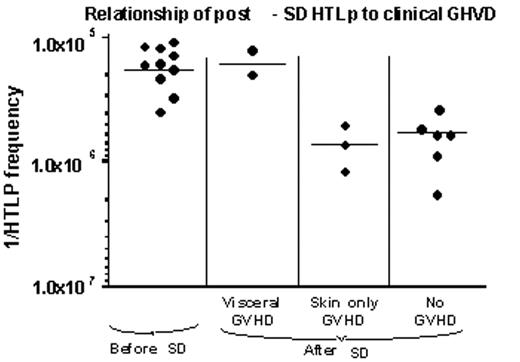Abstract
Graft-versus-host disease (GVHD) remains a major cause of morbidity and mortality after allogeneic stem cell transplant (SCT), especially in older patients. We previously showed that host-reactive donor T cells are selectively depleted (SD) from an allograft ex vivo, following a short co-culture of donor cells with irradiated T cell stimulators from the recipient and subsequent treatment with an anti-CD25 immunotoxin. We report a pilot study to test the hypothesis that GVHD could be decreased in a cohort of elderly patients receiving SD allografts from HLA-identical sibling donors. Sixteen patients, median age 65 years (range 51–73), with advanced hematologic malignancies were transplanted following reduced-intensity conditioning with fludarabine and either cyclophosphamide (n=5), melphalan (n=5), or busulfan (n=6). Cyclosporine was used as the only additional GVHD prophylaxis. SD allografts contained a median CD34 dose of 4.5x106/kg (range 3.5–7.3) and an SD CD3 dose of 1.0x108/kg (range 0.2–1.5). Fifteen patients achieved sustained engraftment. The helper T lymphocyte precursor (HTLp) frequency assay demonstrated depletion of host-reactive donor T cells in 9/11 cases tested from a mean of 1/182,089 to 1/822,354 (mean 5.5-fold depletion), while third party responses were conserved. Kaplan-Meier estimates of probability of grade II-IV and grade III-IV acute GVHD were lower than those seen in a historical control group of patients receiving cyclosporine alone for GVHD prophylaxis (35±13% vs. 57±10%, p=0.34) and (7±6% vs. 38±6%, p=0.05), respectively. Of note, the two patients who developed visceral (gut ± liver) GVHD showed ineffective allodepletion by HTLp (figure). Chronic GVHD occurred in five of 14 evaluable patients. At a median follow-up of 212 days (range 60 – 690), seven of sixteen patients remain alive and in remission. Relapse deaths occurred in four patients (refractory AML [2], therapy-related MDS [1], and CMML [1]). Non-relapse mortality in this high-risk cohort of patients included graft failure [1], GVHD [2], infection [1], and myocardial infarction [1]. In summary, CD25-directed allodepletion of stem cell allografts can reduce clinically relevant acute GVHD following matched related donor transplantation.
Author notes
Corresponding author


This feature is available to Subscribers Only
Sign In or Create an Account Close Modal